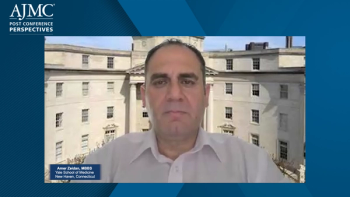
A panelist discusses how ASCO 2025's most important breakthrough was the oral decitabine plus venetoclax combination, representing a potential paradigm shift if approved by the FDA, while highlighting that menin inhibitors (including the already-approved revumenib and pipeline agents like ziftomenib, bleximenib, and enzomenib) are the most exciting emerging therapies targeting 40% to 50% of patients with acute myeloid leukemia with NPM1 mutations or KMT2A rearrangements, though significant therapeutic gaps remain for challenging subgroups like TP53-mutated disease.



